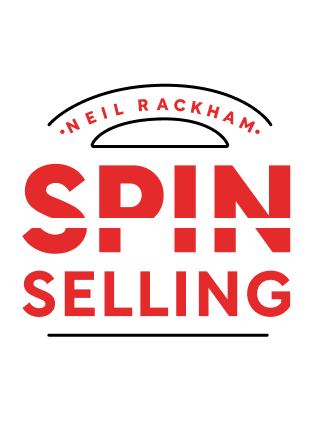

This article is an excerpt from the Shortform summary of "Spin Selling" by Neil Rackham. Shortform has the world's best summaries of books you should be reading.
Like this article? Sign up for a free trial here .
What are need payoff questions? How can they help you be successful in sales?
Need payoff questions are the “N” in the SPIN selling approach. They lead the customer to articulate the benefits of your product or solution. Need payoff questions contribute strongly to success in large sales.
Need payoff questions are one approach to the SPIN selling strategy, and you can use these types of questions to increase the value of your sales and interactions.
The SPIN Selling Approach
Huthwaite researchers found that successful reps in large sales spend the most time on the investigating stage and handle it differently from the traditional approach.
In traditional sales, reps emphasize product features and use standard techniques to address objections and close a sale. In contrast, successful reps ignore traditional techniques and instead focus on asking four different types of questions in a certain order, the SPIN sequence. Here’s how to use this process:
1) S-Situation questions: Start by asking fact-finding and background questions, such as, “What do you see as the company’s biggest growth opportunities?” Asking too many of these questions can impose on the customer’s time and patience, so use them judiciously.
2) P-Problem questions: Once you understand the customer’s situation, ask questions that explore problems or issues your product or solution can solve—for instance, “Are you concerned about meeting your clients’ quality standards with your aging equipment?” Less experienced reps don’t ask enough of these questions.
3) I-Implication questions: Asking good situation and problem questions may be enough to win a small, uncomplicated sale. However, you need to go further in large sales and ask more sophisticated questions that explore the implications or ramifications of a customer’s problem—for example, “How will this affect your fourth-quarter results?” or “What will this mean for your biggest customer?” The point is to underscore a problem’s significance, and create an urgency to address it. These are more difficult questions to frame, even for experienced salespeople.
4) N-Need payoff questions: These questions lead the customer to articulate the benefits of your product or solution. For example, you might ask, “How useful would it be if we could increase your output by 10%?” or “How would being able to reduce errors help you?” When the customer links the value of solving a problem with the capabilities of your product, he’s more inclined to accept your product as the best solution. Need payoff questions contribute strongly to success in large sales.
Need Payoff Questions
While implication questions emphasize the magnitude of the problem, need payoff questions in SPIN selling emphasize the value of your solution.
These are positive questions about the benefits of solving a problem using your solution. For example:
- How would this help you?
- What would be the benefits of solving this problem?
- What makes this solution appealing to you?
Research shows that:
- In larger sales, need payoff questions contribute strongly to success.
- By encouraging the customer to identify the benefits of your solution, these questions make your solution more appealing.
- Influencers who make your case to the decision-maker respond well to need payoff questions.
- Customers rate sales calls with a lot of these questions as helpful and positive.
- Need payoff questions contribute strongly to success in large sales where a good ongoing relationship is important.
Need payoff questions in SPIN selling have two psychological effects:
- They shift the customer’s attention to problem-solving or taking action.
- They engage the customer in identifying the benefits, or payoff, of what you’re offering. For example, if you asked, “How do you think a machine that’s twice as fast would help you?”, the customer might respond, “It would cut our overtime costs.”
Addressing Complex Problems With Need Payoff Questions
In small sales, it’s usually easy for the customer to see how a product will solve her problem. For example, if her concern is protecting important company documents, a secure, fireproof cabinet is an obvious solution.
But in larger sales, the problems—for instance, poor productivity— are more complex. There may be multiple aspects, and your solution may address only one key aspect. You’ll have trouble making a sale if the customer focuses on the aspects your solution doesn’t address, and dismisses it altogether.
Asking need payoffs is the best way to avoid this problem. When you ask questions that get the customer to tell you the ways your solution will help, you forestall objections. Also, when you treat the customer as an expert, he’ll respond positively.
Selling Your Solution Internally
In large sales, where multiple people are involved in a buying decision, you have to depend on influencers to sell your solution to top management in your absence.
Asking the influencer need payoff questions will help him remember and advocate for the benefits of your solution. When the influencer identifies the benefits to his company in a conversation with you, he’s rehearsing for presenting them to his bosses. By participating in identifying the benefits, he’ll feel more confident and enthusiastic about your solution.
Implication Versus Need Payoff Questions
Implication questions and need payoff questions are similar in that they’re both used to transform implied needs into explicit needs. It can be difficult to tell the two types apart.
It may help to think of implication questions as sad and need payoff questions as happy:
- Implication questions are problem-focused; they make problems bigger—they’re sad or negative.
- Need payoff questions are solution-oriented; they ask about the benefits of solving the problem—they’re positive or happy.
Here are some examples of each:
Implication questions:
- Does the slowness of this equipment create backups elsewhere in your production process?
- What impact are your production problems having on your ability to deliver a quality product on time?
Need payoff questions:
- Is this stage of the production process one that you’d like to speed up?
- How would speeding up this stage of the process help you?
Tips for Asking Need Payoff Questions
Need payoff questions in SPIN selling are difficult for reps to get used to asking, despite the fact that, of all the SPIN questions, customers react to them most positively. Here are a few tips:
- Don’t ask need payoff questions before you’ve developed the customer’s problems. Sometimes reps start a sales call with questions like, “If I could show you a faster way to handle your billing, would you be interested?” Feeling manipulated, the customer will respond defensively. You have to develop and magnify needs before asking need payoff questions.
- Don’t ask need payoff questions for which you don’t have the solution—that is, questions about a need your product or service doesn’t address. For instance, don’t ask why the customer needs to produce double-sided copies if your company’s machine only copies one side. You’ll succeed only in making a need you can’t address stronger.
- The time to ask a need payoff question is when the customer reveals a need you can meet. However, at that point, many reps jump right into talking about their solution instead of letting customers identify how having a solution would help them.
Practicing Need Payoff questions
You can improve your skills with practice and effort. Here’s a simple practice exercise:
1) Ask a friend or colleague to help you (he doesn’t need to know anything about selling).
2) Think of a need your friend has—for instance, choosing a new car or vacation destination, or changing jobs.
3) Ask need payoff questions to get the person talking about the benefits of addressing the need. For example, ask, “Why do you think it would be a good idea to get a new car?” “What features do you need that you don’t have now?”
You may be surprised to find that just practicing this exercise with someone can build the other person’s enthusiasm to the point of action. Need payoff questions in SPIN selling are that powerful.
Need Payoff Question Examples
Need payoff questions are more generic than implication questions, which are focused on a customer’s business, so it’s useful to have a supply of need payoff questions ready. Some need payoff question examples are:
- Why is this important or why does it matter?
- How would that help the situation?
- Would it be useful if …?
- How else could this help you?
- How much would it save if….?
Need payoff questions are only one facet of the SPIN strategy. While you’re practicing your skills in need payoff questions, remember to keep working on the other types of questions, too.

———End of Preview———
Like what you just read? Read the rest of the world's best summary of Neil Rackham's "Spin Selling" at Shortform .
Here's what you'll find in our full Spin Selling summary :
- What the SPIN in SPIN Selling stands for
- How to demonstrate real value to the person you're selling to
- How to get commitment from your customer to close the sale fast







Thank you for mentioning that it is important to ask background questions to customers to start the sales process. I want to sell my older car to save up to buy another one this year. I will find a reputable place to sell my car as well locally.